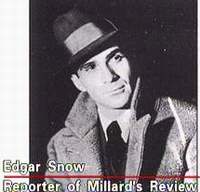 South of the Weiming Lake in Beijing University lies Edgar Snow, an American friend of the Chinese people. His famous "Red Star over China" shook the world. From here he set out for the Northwest China in 1936 and here he wrote the Red Star over China. He Influenced Chinese revolution and Chinese revolution rewrote his life. After he died in 1972, Chinese people buried him here according to his will. South of the Weiming Lake in Beijing University lies Edgar Snow, an American friend of the Chinese people. His famous "Red Star over China" shook the world. From here he set out for the Northwest China in 1936 and here he wrote the Red Star over China. He Influenced Chinese revolution and Chinese revolution rewrote his life. After he died in 1972, Chinese people buried him here according to his will.
Edgar Snow came to China by chance. In the spring of 1928 he bought an old Kodak camera and embarked on an eastward voyage. Five months later he arrived in Shanghai in its humid season. Upon his arrival he went to see John Powell, the chief editor of Millard's Review.
On the outer beach stood an English-style building, which is now called Pujiang Hotel. It was then called the American's hotel with greatest significance in Far East. The hotel saw the first electric lamp and the first telephone used in China. Millard who had reported Yihetuan Uprising for New York Herald in 1900 launched Shanghai's most famous English journal Millard's Review. Snow got a job there. He meant to work six weeks just to make enough money for his next trip.
Snow's first task was to travel along the 8,000-mile railways in China and write reports. For the first time Snow saw corpse-covered fields. He wrote, "Have you seen a man go hunger for a month? Poor Children are just bags of bones. Their bellies filled with bark and saw dust look like with tumors".
This was a journey arranged by Sun Ke, the Minister of Communications. He meant to let Snow write about beautiful places so as to attract American tourists. Seeing the miserable calamity in human world, Snow felt depressed. He only wanted to leave China as soon as possible.
Back in Shanghai he lived in peace again. The city was to mark the 17th anniversary of the Republic of China. Powell wanted Snow to write something to sing the praise of Chiang Kai-shek's Kuomingtang government. But the horrible scenes lingered in Snow's head. Those were real scenes of death. He decided to cry for China's destiny.
In 1928 North China was hit hard by a drought. Snow wrote a report about Five Plagues of China. He said, "This year severe drought attacked Shaanxi. In the famine many died in hunger and thousands and thousands face an impasse. The situation in Henan and Gansu is not much different. The victims of the calamity are estimated to be fifty million. I hope people over the world, on hearing of the disaster, will soon send donations so as to alleviate the terrible hardship."
Not long after, Snow went to Zhangjiakou and Inner Mongolia and wrote more reports on the calamity for the Western readers. He wrote correspondence like "Save 250,000 Lives".
Six weeks later Snow was still in China. He found aid from USA was not used by Chiang Kai-shek to help the victims, but to expand army. Endless wars brought intense sufferings to the people.
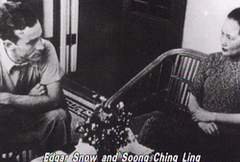 Nanjing Road near the outer beach of Shanghai had many bars and cafes. One day in September 1931 Snow interviewed a beautiful Chinese woman in a cafe there. She's Soong Ching Ling.
Nanjing Road near the outer beach of Shanghai had many bars and cafes. One day in September 1931 Snow interviewed a beautiful Chinese woman in a cafe there. She's Soong Ching Ling.
During the interview Snow learned of the underground revolution in China. In his articles he wrote, "In China Communist is no more a sensational illusion. It has become a force to control the revolution. Chinese Communist Party has 70 to 100,000 members. Some people believe China's communists lack force to make an independent revolution. They are wrong." Later he visited Soong Ching Ling at her home. Admiration for Soong arose in his mind. He wrote a special report about her entitled "She Fights for Chinese Revolution". The article held that Soong was the conscience and eternal core of the idea that the "revolution is not yet completed". He said Soong Ching Ling's words and deeds dispelled his ignorance and let him feel the most beautiful thought of China.
A few days later in the same cafe Snow fell in love with an American girl Helen Foster. She'd become part of his life.
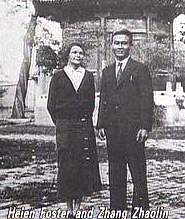 Helen was a secretary of the American Consulate in Shanghai. After reading Snow's articles, she came across the Pacific to see the hero in her mind. Snow's writing had been inspiring her. She decided to take up the pen and she was sure she could do better.
Helen was a secretary of the American Consulate in Shanghai. After reading Snow's articles, she came across the Pacific to see the hero in her mind. Snow's writing had been inspiring her. She decided to take up the pen and she was sure she could do better.
When Snow was enamoured with Helen, Japan occupied Northeast China. On 18 September 1931 Japanese army took Shenyang. Snow went there. He saw fully armed Japanese soldiers. He saw thousands of Chinese people killed. Kuomingtang government ordered not to resist and 30 million people lost their home. All the way Snow saw refugees, many of them were students who were unwilling to be conquered.
Back in Shanghai Snow saw Helen. He tried to forget his unhappy experience and began to court Helen.
He invited her to travel in South China. A few months later she decided to marry him. She no more aimed to surpass him, but to assist him to fulfil his cause.
Just then the Japanese launched war in Shanghai. On the night of 28, January 1932, Snow went to Zhabei station and saw Japanese soldiers kill Chinese soldiers. He immediately sent a telegraph dispatch that appeared on the front page of Chicago Daily News and New York Sun the next day.
Snow was the first international journalist to report this incident. The next day he interviewed Chinese soldiers under fire. He was inspired by the soldiers' strong will to resist to the end. He was also shocked by brutality of the Japanese.
Snow and Helen passed 1932 in bitterness and bliss. On the Christmas they held their wedding in Tokyo. After the honeymoon they returned to China and went to Beijing.
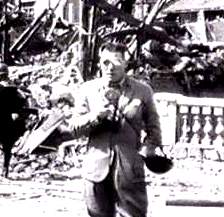 The central government had moved to Nanjing and Beijing was renamed Beiping. But most foreign embassies preferred to stay there and they still called the city Beijing.
The central government had moved to Nanjing and Beijing was renamed Beiping. But most foreign embassies preferred to stay there and they still called the city Beijing.
In Beijing Snow and Helen found quiet lodging in Meizha Lane. Snow gave up his job as a journalist and began to be free-lance writer. The old city Beijing fascinated Edgar Snow. He took in bet on horse racing. With his income from his writing and bet, he maintained an easy life. Helen loved to dance. So Snow often went with her onto the roof of Beijing Hotel where balls were held.
They loved the city wall, the official residences and ruins of gardens. This had once been Empress Dowager Cixi's palace. For Snow and Helen this was a place of historic significance. A year later Snow and Helen rented a villa with apple trees and flowers near Summer Palace. Snow wrote to his sister that he had a study from whose window he could see Summer Palace and the setting sun.
Not far from Summer Palace is the famous Beijing University. In 1930s there stood Yanjing University founded by the American Christian Church. When John Leighton Stuart was its president in 1919, he was determined to make it China's best university. In 1926 Stuart moved it to Haidian District near Yuanming Garden destroyed by Western armies. There was an unkown lake there. It was just a ten-minute walk from Snow's room. Snow and Helen often walked there.
Half of the six teachers in the Journalism Department of Yanjing University were English and American journalists. Snow was one of them. Helen studied Philosophy. There they contacted Chinese students.
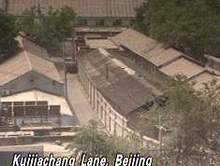 Weiming Lake was beautiful, but the campus was not calm. Yanjing University had many students from Northeast China. Chairman of the student union Zhang Zhaolin was one. They were homesick, while Japanese began to enter the North China.
Weiming Lake was beautiful, but the campus was not calm. Yanjing University had many students from Northeast China. Chairman of the student union Zhang Zhaolin was one. They were homesick, while Japanese began to enter the North China.
Under the pressure of Japanese, the Kuomingtang government cancelled Beiping Military Committee and set up Hebei-Chahar Political Committee.
When Qinghua University packed up the books and was to transport them to south, Snow and Helen left Yanjing University and moved in Kuijiachang Lane. Their quiet courtyard stood against the city wall, but their life was not quiet.
One day in October, Zhang Zhaolin came to ask Snow and Helen if China would give North China to Japan. When the rumor was confirmed, Zhang cried.
It's no use crying, said Snow, you must take action! As an American journalist, he should have been neutral, but he and Helen took side with China.
Helen suggested to launch a student movement. A few days later Zhang Zhaolin came with some friends and discussed a plan with Snow and Helen. They later turned out to be leaders of the December 9th Movement.
Beijing University's student Huang Jing, originally named Yu Qiwei, was an active member of the underground Communist Party. On December 7th Beiping Student Federation decided to hold a patriotic demonstration against the establishment of "Hebei-Chahar Political Committee".
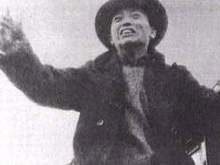 On December 9th two thousand students from different universities marched on the streets. Snow, Helen and several other international journalists joined the demonstration. Snow took pictures of the parade. Snow said, "Nym and I seldom watch a parade, but this time we take pride in being together with the leaders of the demonstration."
On December 9th two thousand students from different universities marched on the streets. Snow, Helen and several other international journalists joined the demonstration. Snow took pictures of the parade. Snow said, "Nym and I seldom watch a parade, but this time we take pride in being together with the leaders of the demonstration."
Early morning that day students of Qinghua and Yanjing universities gathered and set for Xizhimen Gate. When they arrived at Xizhimen Gate, armed police shut the gate and blocked the students.
A girl student was pushed at the centre of the storm.
On December 16th, Beiping students held another greater demonstration. The students of Qinghua and Yanjing universities were again blocked by armed police at Xizhimen Gate. Then Lu Cui crept in through under the gate, meaning to open the gate from within. Tens of armed policemen seized her and placed her in confinement.
This kind foreigner was Edgar Snow. He interviewed Lu Cui in the lockup and compared her to China's Jeanne d'Arc. Snow's report showed Chinese students' courage and strength to the world. Consequently Kuomingtang government cracked down on students.
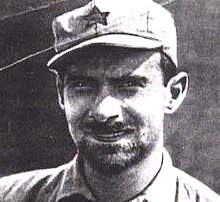 In Snow and Helen's courtyard, Lu Cui took these two valuable pictures.
In Snow and Helen's courtyard, Lu Cui took these two valuable pictures.
Months later, Snow went to Shanghai. During his contact with student leaders, he felt Communist Party's leading role in the movement. He cast his eyes to communist-controlled North Shaanxi. With help of Yu Qiwei, he got into contact with Liu Shaoqi. Snow was the first international journalist to visit North Shaanxi. He went to Shanghai and asked Soong Ching Ling to plan his journey. In June 1936 when Chiang Kai-shek announced to suppress the Red Army in North Shaanxi, Snow started his great journey from Beiping.
Thus began a venture of an international journalist in China.
|